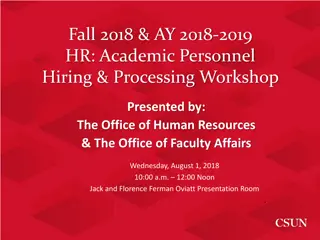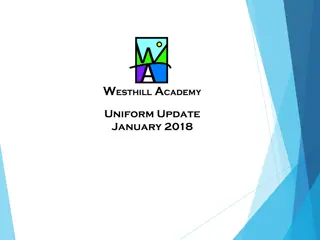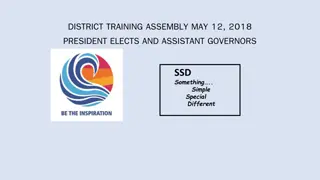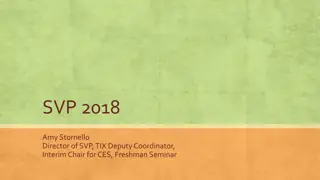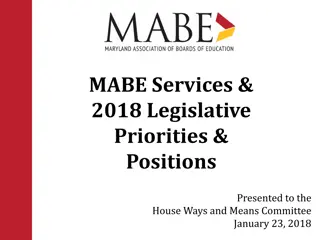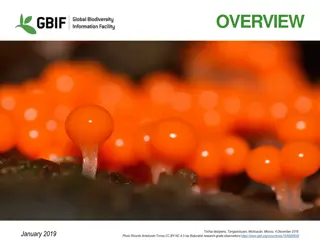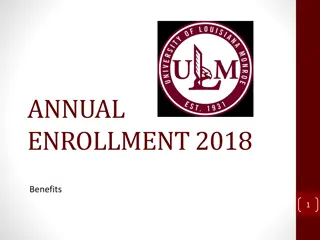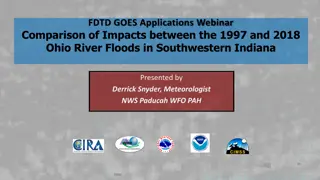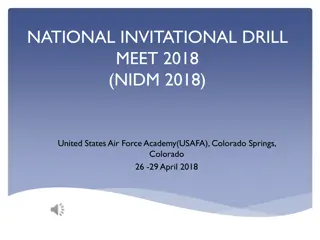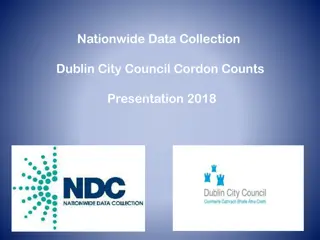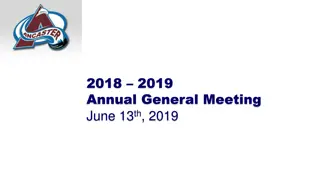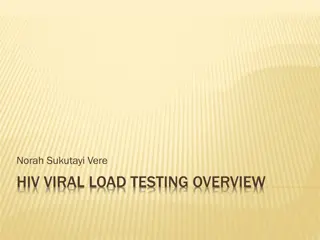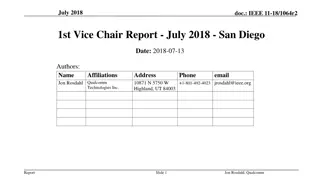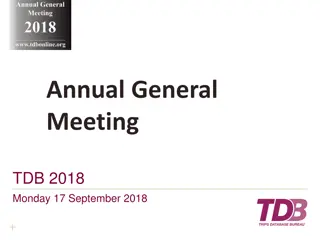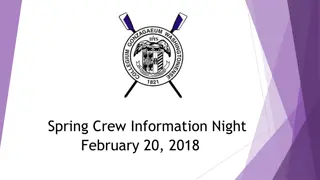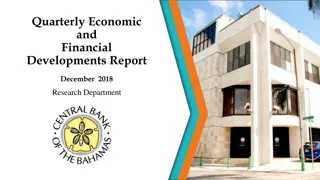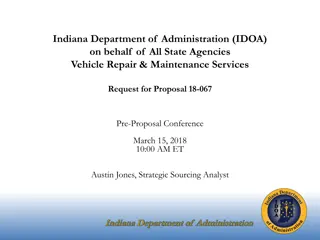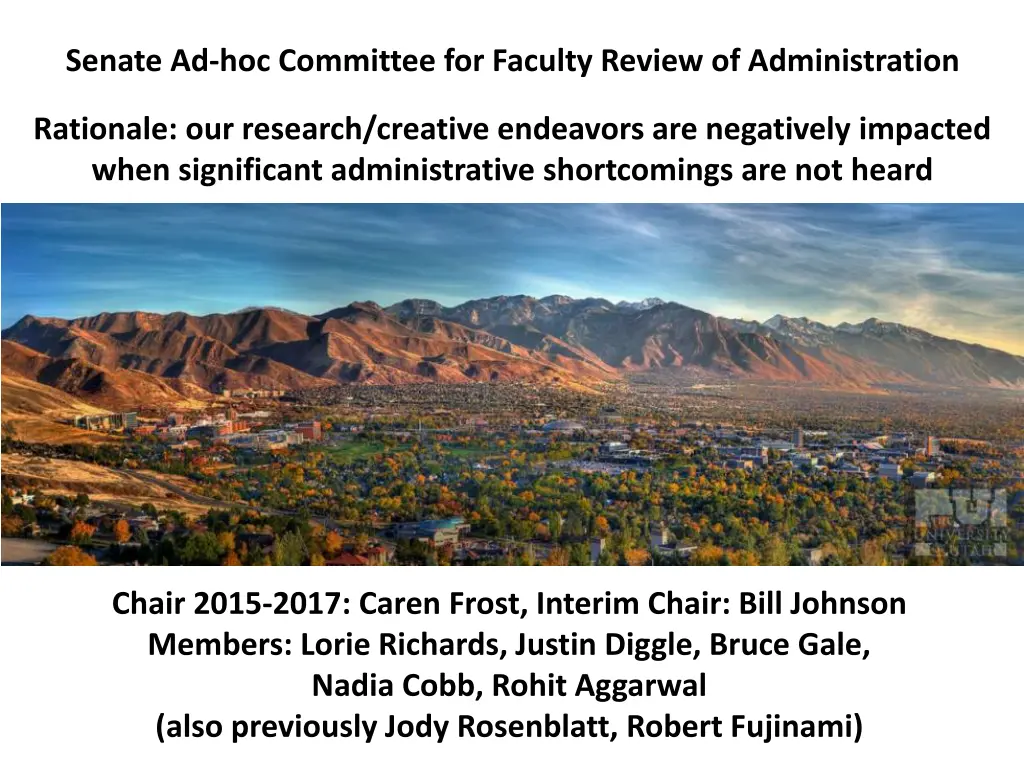
Ad-hoc Committee for Faculty Review of Administration
Explore the work and proposals of the Senate Ad-hoc Committee for Faculty Review of Administration. Review past practices, current initiatives, and future plans to enhance administrator review processes. Collaboration with AVP for Faculty and Deans for effective governance.
Uploaded on | 0 Views
Download Presentation

Please find below an Image/Link to download the presentation.
The content on the website is provided AS IS for your information and personal use only. It may not be sold, licensed, or shared on other websites without obtaining consent from the author. If you encounter any issues during the download, it is possible that the publisher has removed the file from their server.
You are allowed to download the files provided on this website for personal or commercial use, subject to the condition that they are used lawfully. All files are the property of their respective owners.
The content on the website is provided AS IS for your information and personal use only. It may not be sold, licensed, or shared on other websites without obtaining consent from the author.
E N D
Presentation Transcript
Senate Ad-hoc Committee for Faculty Review of Administration Rationale: our research/creative endeavors are negatively impacted when significant administrative shortcomings are not heard Chair 2015-2017: Caren Frost, Interim Chair: Bill Johnson Members: Lorie Richards, Justin Diggle, Bruce Gale, Nadia Cobb, Rohit Aggarwal (also previously Jody Rosenblatt, Robert Fujinami)
Work previous to current academic year (before 2017-2018): Survey of units by committee members established that: 1) Administrator reviews not performed consistently across units 2) Solicitation of faculty/staff/student input uneven from unit to unit 3) Constituent faculty/staff/students unaware of reviews 4) Solicited input from faculty/staff/students not provided back to constituent faculty/staff/students Among PAC12 institutions: Most aggressive is CU Boulder, whose Faculty own the administrator review process, with posting of verbatim comments to web UCLA keeps reviews on record for senate review for one month U. Arizona conducts an open forum intended to provide the administrator being reviewed with an opportunity to discuss lessons learned and future directions Other PAC 12 peers do not appear to disseminate information to constituents Committee consensus: explore possibility of U. Utah Faculty administering the faculty/staff/student input and narrative output back to constituents Positive: Enhanced shared governance; Negative: Committee work
Work during this academic year (2017-2018): Draft policy proposal to establish standing faculty review of administration committee: 1) Comprehensive input from faculty/staff/students 2) Provide narrative information (performed by non-constituent faculty) back to constituent faculty/staff/students FRoA committee recently met with AVP for Faculty and AVP-invited Deans, with agreement to work together to explore enhancing the existing administrator review guidelines in three critical ways: 1) Explore possibilities and/or develop plans to spread best administrator review practices to other units 2) Provide back to constituent faculty/staff/students a brief narrative demonstrating that concerns were heard and considered when significant numbers of constituents express related concerns 3) Include mid-term review for Deans serving a 5-year terms Revised Administrator Review Guidelines not received
Faculty Review of Administration Committee (for consideration): Electronic surveys with narrative returned to constituents does not pre-empt administrator survey of constituents. 44 reviews per semester would be distributed among approximately 25 FRoA members (members = senators?). Each FRoA member would work in a subset pair and will carry primary responsibility for 2 reviews and secondary responsibility for 2 additional reviews. The work hours associated with primary responsibility (providing guidance to college- level RPT committees and developing the draft narrative from survey results) is estimated to be 2-3 hours (yielding 4-6 hours per semester for primary work). The work hours associated with secondary responsibility (review of draft narrative) is estimated to be 0.5 hours (yielding 1-2 hours per semester for secondary work). The total expected combined primary and secondary workload is approximately 6 to 8 hours per semester. Term Activity Solicit ratings Write narratives Fall Deans & library admin. (~ 40 mid and full term per 5 years = 8 per fall semester) Dept. Chairs (~ 110 full term per 3 years = 36 per fall semester) Spring Dept. Chairs (~ 110 full term per 3 years = 36 per spring semester) Deans & library admin. (~ 40 mid and full term per 5 years = 8 per spring semester)

